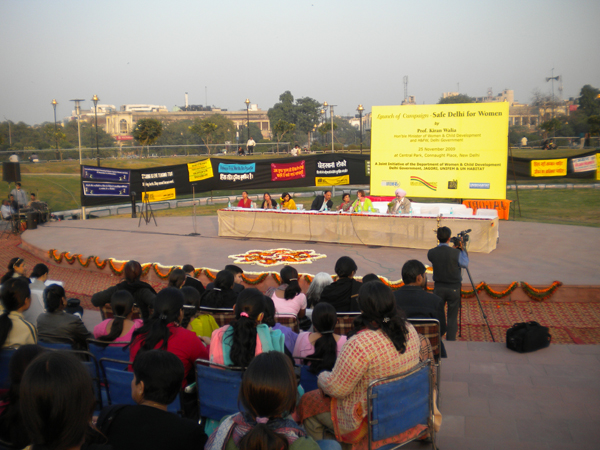In the year 2009, Jagori in partnership with UN Women and Department of Women and Child Development launched the ‘Safe City Free of Violence against Women and Girls Initiative’. The goal of the initiative is: “ Cities where women and girls are able to move around freely without the fear of harassment and violence at all times and enjoys what the city has to offer”.

As part of the first phase, a baseline study was undertaken of more than 5000 residents (men and women) in the NCT region. This survey provided exhaustive information related to typologies of harassment, vulnerability of women, ways of dealing harassment etc. The negotiations that a woman undertakes in her day to day life were reflected in this study. It is on the basis of this, a Strategic Framework for Safer and Violence Free City for Women and Girls was also designed.
Click here to read the Baseline Survey 2010 report
Click here to read the Strategic Framework
As part of the safer cities Initiative, Sakhi, Kerala joined hands with Jagori to start safe cities campaign in Trivandrum and Kozhikode cities. The research was conducted and a strategic framework for the two cities was drafted. The research findings and then advocacy, led a series of short term changes within Kerala. Initially, the State transport Department collaborated with Sakhi and a circular was passed on safe travel for women in KSRTC buses and compulsion of wearmin name tags by the staff. The Kerala Police Act was being reviewed that time and recommendations were incorporated. Many other women's groups like Anweshi Resource Centre, SEWA, Kudumbashree and others joined with initiative.
Click here to read the Kerala research study
Jagori joins the UN Women Safe Cities Global Programme (2011-15)
The intensive work of the first phase in Delhi and Kerala now is a part of the UN Women Global Programme being implemented in five different cities, Cairo, New Delhi, Kigali, Port Moresby and Quito.
The 2011 – 2015 UN Women Safe Cities Global Programme is a unique initiative that aims to develop models that serve to reduce and prevent sexual violence against women and girls in public spaces. These models can be adapted to fit each local context by local authorities and decision-makers, including women’s grassroots organizations, community groups and other leading national and international networks. Focusing on slum areas and impoverished neighbourhoods, the collective efforts of Safe Cities partners are meant to empower women and their communities in the five pilot cities Click here to read more
The second phase of the programme in Delhi builds on the existing partnership of Jagori, Government of Delhi and UN Women and would focus of city wide advocacy for gender sensitivity and mainstreaming and focused work in municipal wards of south Delhi, Badarpur, Haus Khas, Malviya Nagar, Mehrauli and Molarband. In Kerala, the work has interestingly been initiated in four cities, Thiruvananthapuram, Kozhikode, Thrissur and Ernakulum.
In Delhi, in the last one year, some key activities have been completed. To start with multiple implementation design planning workshops were conducted with diverse partners of the programme. Namely, the March Consultation under the leadership of the Chief Secretary of Delhi and Meeting of the Advisory Group of the prograame gave the leadership, views and vision to finalise the Design draft. Post the design document being accepted by a key government departments like the Education, Public Works, Transport, Women and Child Development, Police, Urban Planning, Mission Convergence, Delhi Women's Commission, etc and several women's and citizen rights groups and collectives, the activities have begun.
In partnership with Casp Plan Delhi Unit, Satark Nagrik Sangathan and TARA, Jagori has initiated strengthening community collectives of largely women and youth in the five aforementioned municipal ward of Delhi. The groups have also conducted safety audits in their neighbourhood, to identify gender gaps in infrastructure and essential services. The findings are being collated to be share with the respective authorities for immediate action plan.



More details soon.

